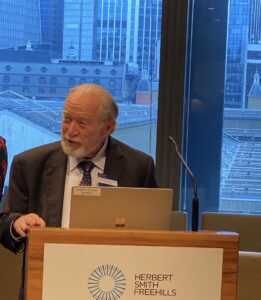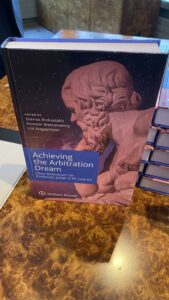This post summarizes two events held as part of Day 3 of the 2023 London International Dispute Week (“LIDW”). First, the panel “Developments in the Arbitration Law of England & Wales: Impact on Arbitration Globally and London’s Place in the World” organized by Debevoise & Plimpton. Second, the joint special event organized by the School of International Arbitration at Queen Mary University of London and Herbert Smith Freehills to honor and celebrate the remarkable contributions of Professor Julian D M Lew KC.
Developments in the Arbitration Law of England & Wales: Impact on Arbitration Globally and London’s Place in the World
The panelists for this event included Alipak Banerjee and Vyapak Desai (Nishith Desai Associates), Camilla Godman (Omni Bridgeway), Lord Goldsmith KC PC (Debevoise & Plimpton) and Lord Neuberger KC PC (One Essex Court), with moderation by Shreya Arem (Debevoise & Plimpton).
The panel focused on the proposed reforms to the Arbitration Act 1996 (“Act”) by The Law Commission of England and Wales (“Commission”) and international developments that could affect London’s place as a leading seat of arbitration.
The panel first addressed why London is one of the most popular and attractive cities as a seat of arbitration and what London does better. Lord Neuberger KC PC noted that London has a brand reputation including because many leading lawyers, judges and experts are located in London. He further noted the role of the English language and dominance of common law approaches in key jurisdictions in which arbitrations take place. That said, he noted the negative impacts of Brexit going forward. Camilla Godman stressed that certainty of English law, freedom to contract and courts’ willingness to be bound by the parties’ agreement had helped London to become popular as an arbitration seat. She noted that other jurisdictions have engaged in efforts to position themselves as arbitration centres. She noted that three big steps have taken place in Singapore in order to make the city attractive in regard to being a seat of arbitration: passing laws enabling arbitration to take place; welcoming foreign arbitration practitioners into Singapore and learning from them to help to build an arbitration community in Singapore; and putting resources into campaigning for Singapore as a seat of arbitration. Vyapak Desai agreed that Singapore is often a preferred choice from an Asian perspective and is particularly good at attracting Indian cases. He stressed that Singapore’s marketing program has yielded results, with users having confidence in Singapore as a seat judicially and politically.
Alipak Banerjee agreed that London enjoys the benefits of a predictable and strong legal system, noting also that it is an important centre for finance, and boasts highly qualified lawyers.
The panellists also discussed how London could become a more attractive seat for Asian cases. Lord Neuberger KC PC noted that London could be more immigration-friendly (including in respect of visa requirements for individuals engaged in arbitral proceedings) and further stressed that the Arbitration Act 1996 should be updated to address current needs. He noted, in this respect, that some challenges are yet to be addressed as part of reform efforts including for instance confidentiality and third-party funding. He further noted that there has always been a lively debate about whether arbitrators have power for summary disposal, but that addressing such power in the reformed Act would be sensible ensure that there is no doubt in this regard. Lord Neuberger KC PC further endorsed a focus on the importance of disclosure in relation to arbitrator independence and impartiality.
Camilla Godman noted the Commission’s approach was effectively not to deal with what is not broken. She noted that the UK has a competitive market regarding third party funding, but that activities of professional funders are codified in other jurisdictions (including Hong Kong and Singapore), which is not the approach elected for London. Camilla Godman stated that the whole range of alternative dispute resolution should be considered, not just arbitration, in order to maintain London as a preferable seat. She supported the decision to omit confidentiality from current reform efforts. She stressed that if confidentiality were to be codified under an updated Arbitration Act 1996, there would be too many exceptions required and that the case-by-case development of exceptions by courts was a preferable scenario to legislative codification.
Alipak Banerjee noted existing efforts to make London more attractive, noting for instance that there has been a 51% increase in goods and services exchanged between the UK and India between 2021-2022, with many disputes related to such investments being arbitrated by tribunals seated in London. He noted, however, that practice requirements in Singapore mean that lawyers can more easily act as co-counsel in arbitrations seated there. and that arbitral appointments in Singapore are more inclusive of foreign judges and senior advocates. He noted, further, that changes in Indian law mean that two Indian parties are now allowed to elect a seat of arbitration outside of India, and therefore Indian cases may increasingly be seated in jurisdictions like Singapore.
Alipak Banerjee agreed with the Commission’s decision not to deal with issues of techonology, such as artificial intelligence and data protection, noting the difficulties of regulating these matters. He noted that the LCIA has introduced Article 30A on this matter which encourages arbitrators to include specific provisions on data protection. He stressed that it is better to regulate this issue on a case-by-case basis, given that data will be governed by its location (and the location of the parties).
As the panel was coming to end, panellists asked their opinions on regards with what would be one radical change to attract Asian and Indian parties to London. Vyapak Desai stated that it would be more inclusion of parties in system, where Lord Neuberger KC PC stated government and institutions working together to ensure foreign practitioners would feel more welcomed and have easy access. Furthermore, Lord Goldsmith KC PC also stated it would be easy access to enter to UK and resolve obstacles regarding immigration, where Camilla Godman stated that it would be improving legal certainty around recovering the cost of funding, and Alipak Banerjee stated that it would London to tap into the new legal sectors that has just opened.
Celebrating Professor Julian D M Lew KC: A Tribute to a Trailblazer in International Arbitration
Notable practitioners from the international arbitration community gathered to pay tribute to Prof. Lew, recognizing his invaluable influence on the field. The event also marked the launch of a book in the form of a Liber Amicorum titled “Achieving the Arbitration Dream,” edited by Stavros Brekoulakis, Romesh Weeramantry, and Lilit Nagapetyan. This post summarizes the event, highlighting the speeches, testimonials, and significance of the Liber Amicorum.
 The event celebrating Professor Julian D M Lew KC began with heartfelt speeches from individuals who had the privilege of working closely with him throughout his renowned career.
The event celebrating Professor Julian D M Lew KC began with heartfelt speeches from individuals who had the privilege of working closely with him throughout his renowned career.
Sir Roy Goode CBE KC reminisced about his first encounter with Prof. Lew at an international conference. He fondly recalled their initial discussions regarding the establishment of a school focused on teaching arbitration, housed within the Center for Commercial Law Studies. Sir Goode acknowledged Prof. Lew’s role as a “wonderful teacher and friend” and emphasized the significance of his early work addressing applicable laws in international commercial arbitration.
Paula Hodges KC, reflecting on her experiences at Herbert Smith Freehills, referred to Prof. Lew as the “father of arbitration” within the firm. She highlighted his instrumental role in convincing others to embrace arbitration. Hodges expressed her gratitude for the legacy Prof. Lew had created, propelling the firm’s practice in international arbitration to its current heights.
Stavros Brekoulakis paid tribute to Prof. Lew’s pioneering contributions to the law and practice of international arbitration. He acknowledged Prof. Lew’s pivotal role in initiating the teaching of international arbitration at Queen Mary University, four decades ago when skepticism regarding the theoretical and academic value of the subject prevailed. Brekoulakis praised Prof. Lew as a “trailblazer” who foresaw the future significance of learning and teaching in the field.
Charles Kimmins KC, from Twenty Essex, highlighted the privilege of having Prof. Lew as a member of the chambers for the past two decades. While acknowledging Prof. Lew’s accomplishments as an academic, counsel, and arbitrator, Kimmins shifted the focus to Prof. Lew as a person. He emphasized that Prof. Lew’s willingness to offer support and guidance to anyone facing challenges in chambers made him an invaluable mentor and friend.
Romesh Weeramantry celebrated Prof. Lew’s qualities as a person, mentor, friend, and arbitrator. He highlighted the overwhelming positive response received when reaching out to contributors for the Liber Amicorum. Weeramantry noted that the cover of the book features Socrates, symbolizing Prof. Lew’s Socratic teaching method and the wisdom he possesses.
Lilit Nagapetyan expressed her joy at seeing the Liber Amicorum project come to fruition. She shared her resonance with the experiences shared by Prof. Lew’s past students, as reflected in their heartfelt contributions to the book.

Eleanor Taylor from Wolters Kluwer expressed gratitude for Prof. Lew’s invaluable contributions to the International Arbitration Law Library. She acknowledged the forthcoming 65th volume of the library and recognized the significant role played by Prof. Lew in his contributions to the library. She added that Wolters Kluwer was immensely proud to publish the book.
Prof. Lew expressed his gratitude for the honor and looked forward to immersing himself in the insightful content of the book.
The event celebrating Professor Julian D M Lew KC was a testament to his exceptional contributions and influence in the field of international arbitration. Esteemed speakers and attendees praised Prof. Lew’s pioneering work, mentoring abilities, and dedication to teaching. The launch of the Liber Amicorum, “Achieving the Arbitration Dream,” was a fitting tribute to Prof. Lew’s remarkable career. The collection of contributions serves as a testament to the profound impact he has had on international arbitration.
The book, “Achieving the Arbitration Dream – Liber Amicorum for Professor Julian D M Lew KC” is available here.
________________________
To make sure you do not miss out on regular updates from the Kluwer Arbitration Blog, please subscribe here. To submit a proposal for a blog post, please consult our Editorial Guidelines.


